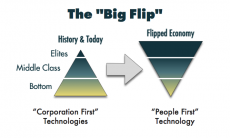You’ve probably been hearing a lot about content farms, the low-rent district for content marketing. Google has avowed a crackdown on content farming, threatening to lower their rankings in search results. In case you don’t think content farms can have much effect on search results, you should know that just one company many claim to run a content farm, Demand Media, is said to publish one million new pages each month. But what are content farms and what are they doing that is so wrong?
Some content farms “create” scads of content, mostly by lifting it from somewhere else. They don’t copy entire articles, just a paragraph here and a sentence there, stitched togtether just enough that it is semi-readable and semi-original. Google reserves a special level of ire for this faux content that exists just to hijack searchers from what they were really looking for. Nobody can easily defend these tricksters stealing content from others and passing it off as their own.

Image via Wikipedia
But many content farms, Demand Media among them, claim that these accusations paint with a broad brush, and that they do not steal any content, instead paying writers (small amounts) to create truly original content. While most forms of spam are relatively easy to identify, in some ways Demand Media is doing the same things that other content marketers do. Content farms are creating content to be attractive to search engines, just like any reasonable SEO marketer or content marketer. It’s these operations that say they are not copying content that pose a more interesting question–what’s the difference between these content farms and legitimate content marketers.
To me, it is in the approach. Content farms are much more about quantity than quality. Hack writers are paid minuscule amounts to churn out page after page of low-quality content filled with search keywords, all to rank highly in search results. I don’t know whether that description fits Demand Media or any of the other content farms that Google might be cracking down on, but it’s telling that a subjective measure of quality is sometimes the only thing that stands in the way of being dubbed a content farm when you think you are a content marketer.
So let’s look at our content farm checklist. Oodles of content. Check. Low-paid writers. Check. High search rankings. Check. So the biggest content farm of all time is…Wikipedia? Nope. It’s all about the approach. Wikipedia, which pays its writers nothing, is all about high quality standards. Searchers actually are happy to get a Wikipedia page. Some seek them out. The difference is all about content quality.
Wikipedia is trying to maintain enduring, authoritative content that satisfy searcher needs. As I’ve written before, if your attitude is that you are willing to do anything to attract those Google searcher clicks, eventually your technique will stop working. Unless what you are doing also works for searchers and for search engines, eventually the search engines will shut it down, as Google is trying to do with content farms.
So what about newcomers such as Qwiki? It has nicely crafted slide shows with a computerized voice reading perhaps not the best content about loads of subjects. The productions values are high but the content itself might not be the most informative. I’d say the jury is out on this one. Let’s see if people like the content, because that is the only real distinction between a content farm and a legitimate content marketer—so long as no one’s material is being stolen.
Content farms benefit only the SEO marketer, not search engines or searchers, while truly quality content marketing benefit everyone. As you make your content marketing plans, it pays to notice the difference.






